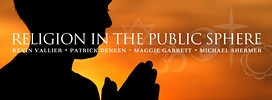Religious and faith-based views on politics may occasionally contribute to improved social order and moral progress, as Kevin Vallier suggests, and thus it would seem an overlapping consensus on different approaches would be in order. After all, the world is big enough to allow room for all views to be heard, and so it came to pass that the wolf shall dwell with the lamb and the leopard shall lie down with the kid…
Unfortunately such diversity and openness is not in the DNA of religion. As I write in The Moral Arc: “The rules that were dreamt up and enshrined by the various religions over the millennia did not have as their goal the expansion of the moral sphere. Including other sentient beings within the circle of moral concern was not on their radar. Moses did not come down from the mountain with a detailed list of the ways in which the Israelites could make life better for the Moabites, the Edomites, the Midianites, or for any other tribe of people that happened not to be them.” Change in religious beliefs and practices, when it happens at all, is slow and cumbersome, and it is almost always in response to the church or its leaders facing outside political or cultural forces, as in the abolition of slavery for Christianity and the abandonment of polygamy for Mormonism.
To the extent that religions and religious adherents are tolerant of dissenting views and open to diverse opinions, it is primarily the result of them being pulled up by the secular forces of science and reason, which do have in their genetic makeup the principles of disputation and debate, empiricism and experimentation, and the understanding that human cognition is flawed and subject to self-serving biases and so must be subjected to constant checks and balances. This was what the Founding Fathers understood and established in the U.S. Constitution with its many checks and balances on power. As James Madison noted in Federalist 51: “If men were angels, no government would be necessary. If angels were to govern men, neither external nor internal controls on government would be necessary.” It is what Edmund Burke was thinking when he reflected on the French Revolution: “The restraints on men, as well as their liberties, are to be reckoned among their rights.”
Christianity went through the Enlightenment and came out the other end civilized and tolerant, eventually leaving behind such barbarities as the slave trade and the insanity of the witch hunts. Islam has yet to experience an Enlightenment, leaving many of its adherents to embrace the letter if not the spirit of Sharia Law with its illiberal beliefs in the inferiority of women, the inhumanness of infidels and nonbelievers, and the belief that God’s laws (as interpreted by them, of course) trump human laws.
Finally, unlike science, religion has no systematic process and no empirical method to employ to determine the verisimilitude of its claims and beliefs, much less to determine right and wrong. To the extent that religions got it “right” (as judged by today’s enlightened standards), they did so as a result of haphazard trial and error, reinterpreting holy scripture to fit current standards. Recent debates about what is “really” in the Quran are a case in point. It doesn’t matter what the words “really” mean, because they are all made up anyway - just as in the now-accepted understanding that the Bible was written by Iron Age peoples and not by the creator of the universe. What matters is what believers believe is in their holy books because that is what they act on, and actions are what matter in the realm of politics.

